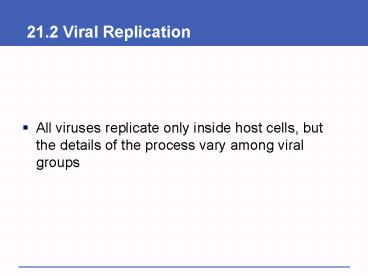21.2 Viral Replication - PowerPoint PPT Presentation
1 / 11
Title:
21.2 Viral Replication
Description:
21.2 Viral Replication All viruses replicate only inside host cells, but the details of the process vary among viral groups Table 21-2, p. 336 Stepped Art ... – PowerPoint PPT presentation
Number of Views:149
Avg rating:3.0/5.0
Title: 21.2 Viral Replication
1
21.2 Viral Replication
- All viruses replicate only inside host cells, but
the details of the process vary among viral groups
2
Stepped Art
Table 21-2, p. 336
3
Bacteriophage Replication
- Lytic pathway
- Under direction of viral genes, the host makes an
enzyme that lyses and kills the cell - Lysogenic pathway
- Virus enters a latent state
- Host replicates viral genes and passes them on to
descendents before entering lytic pathway
4
A1 Viral DNA is inserted into host chromosome by
viral enzyme action.
A Virus particle binds, injects genetic material.
A2 Chromosome and integrated viral DNA are
replicated.
E Lysis of host cell lets new virus particles
escape.
Lytic Pathway
Lysogenic Pathway
D Accessory parts are attached to viral coat.
A3 Cell divides recombinant DNA in each
daughter cell.
B Host replicates viral genetic material, builds
viral proteins.
A4 Viral enzyme excises viral DNA from
chromosome.
C Viral proteins self-assemble into a coat
around viral DNA.
Fig. 21-4, p. 337
5
Replication of an Enveloped DNA Virus
- Example Herpes
- Viral envelope fuses with host membrane viral
DNA enters host cytoplasm - Viral DNA enters nucleus, directs synthesis of
new viral DNA and proteins - New viral particles are assembled and enveloped
in host nuclear membrane - New viral particles exit cell by exocytosis
6
Prokaryotic Reproduction
- Prokaryotic chromosome
- A circular, double-stranded DNA molecule
- Prokaryotic fission
- DNA replicates parent cell divides in two
7
Prokaryotic Fission
8
Horizontal Gene Transfers
- Conjugation
- Transfer of a plasmid (non-chromosomal DNA)
between prokaryotic cells via a sex pilus - Transduction
- Transfer of prokaryotic genes via bacteriophages
- Transformation
- Prokaryotic genes acquired from the environment
9
Conjugation
10
(No Transcript)
11
(No Transcript)































